Keywords:
Game, Device, Research in the classroom, Experience, School contextAbstract
The following paper is a reflective article, which emerges from the research in the classroom: “The game as a didactic device in the kindergarten classroom”. There are several studies that have been carried out around this topic, taking into account that the game is inherent to the children’s experiences, childhood cannot be tackled without playing, it is important to reflect on the sense and meaning of the task and the teaching practice and is in the kindergarten grade where the game in all its dimensions can be found. Proposed in the school environment, it becomes a trigger that the teacher has in his/her favor and it is even more if it starts to be considered as a whole didactic device that offers both the student and the teacher a valuable cog in the experiences of great possibilities. In addition, if serious research processes are carried out within the classroom, each of the experiences offered and constructed by and for the student will be increasingly relevant, since the exercise of critical observation, together with the analysis, the evaluation, the deepening and appropriation of conceptions, will direct more conscious, real dynamics and In accordance with the anticipated expectations. When the research is framed within the qualitative approach, a description of the sense and meaning of the game as a didactic device to develop cultural practices will be made. Being a teacher implies, then, to expand the universe of interpretations in a process of constant communication with students and between students, and turn them into a permanent transformation.
Downloads
References
Euceda, T. (2007). El juego desde el punto de vista didáctico a nivel de Educación Prebásica. Tegucigalpa: Universidad Pedagógica Nacional Francisco Morazán.
García, F., & García, M. (1995). Aprender investigando. Una propuesta metodológica basado en la investigación. Universidad de Sevilla: Editora Diada.
Gómez, J. (2017). El Juego Infantil y su Importancia en el Desarrollo. Revista CCAP, 10(4). Recuperado de https://scp.com.co/precop-old/precop_files/modulo_10_vin_4/1_jtw.pdf
Herrera, J. (2013). Pensar la Educación. Hacer la investigación. Bogotá: Universidad de la Salle. Recuperado el 11 de noviembre de 2017, de http://www.proeduk.com/wp-content/uploads/2016/05/diecinueve.pdf.
Huizinga, J. (1954). Ideal Caballeresco, juego y cultura. Buenos Aires: Editorial Ecenee.
Ministerio de Educación Nacional de Colombia (2014). El juego en la Educación inicial. Documento 22.Orientaciones Pedagógicas para la educación inicial en el marco de la educación integral. Bogotá.
Moreno, J. (2002). Aproximación teórica a la realidad del juego. Experiencia a través del juego. España: Ediciones Aljibe.
Peña, A., & Castro, A. (2012). Profe: te invito a jugar. El juego un espacio para la participación infantil. Bogotá: Cidne.
Piaget, J. (1985). Seis estudios de Psicología. Barcelona: Educación Planeta.
Sarlé, P. (2.011). El Juego como Espacio Cultural, Imaginario y Didáctico. Revista Infancia Imágenes, 10(2). Recuperado el 17 de noviembre de 2017, de Dialnet-ElJuegoComoEspacioCulturalImaginarioYDidactico-4222607%20(3).pdf. https://revistas.udistrital.edu.co/ojs/index.php/infancias/article/view/4451
Tonucci, F. (2014). Tonucci: “El alimento de la escuela debería ser la experiencia de los niños”. Recuperado el 19 de noviembre de 2017, de http://blog.tiching.com/francesco-tonucci-el-alimento-de-la-escuela-deberia-ser-la-experiencia-de-los-ninos/
Tonucci, F. (2014). Más juego, más movimiento. [Video de YouTube]. Recuperado el 17 de noviembre de 2017, de https://www.youtube.com/watch?v=cyGuCkcl5PI.
UNESCO. (1980). El niño y el juego, Planteamientos teóricos y aplicaciones pedagógicas. París: Unesco.




